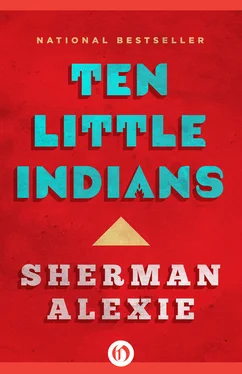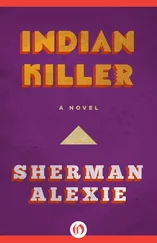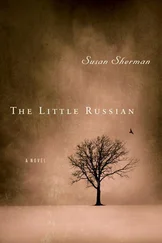Frank played so well that he earned (and re-earned) a playground reputation and was known by a variety of nicknames: Shooter, Old Man, Chief, and Three. Frank’s favorite nickname was Oh Shit, given to him in July by a teenage Chicano kid in MLK, Jr. Park.
“Every time the old Indio shoots and makes one of those crazy thirty-footers,” the Chicano kid had said, “his man be yelling, ‘Oh shit, oh shit, oh shit!’”
Frank was making a comeback, though he hated that word as much as Norma Desmond had hated it, and just like her, he preferred to call it his return. After all, over the course of the year, a few older players had recognized Frank and remembered him as the supernatural Indian kid who’d disappeared from the basketball world two decades ago.
On the basketball courts of Seattle, Frank was the love child of Sasquatch and D. B. Cooper; he was the murder of Charles Lindbergh’s baby, the building of Noah’s Ark, and the flooding of Atlantis; he was the mystery and the religion and the outright lies.
During one legendary game at the University of Washington Intramural Activities Building, Frank caught the ball in the low post and turned to face Double O, the Huskies’ power forward. He was a Division I stud slumming among the gym rats, a future second-round draft pick destined to be eleventh man for the Cleveland Cavaliers, which didn’t sound glamorous but still made him one of the thousand best basketball players in the world.
“Oh Shit, you better give up the rock,” Double O taunted. “I ain’t letting you win this game.”
Frank faked the jumper and dribbled right, but Double O, five inches taller and seventy-five pounds heavier, easily pushed Frank away from the key.
“Oh Shit, you’re an old man,” taunted Double O. “Why you coming after me? I ain’t got your social security check.”
Frank dribbled the ball between his legs, behind his back, then between his legs again. He didn’t know why he was bouncing the ball like a madman. There was no point to it, but he wanted to challenge the trash-talking black kid.
“Oh Shit, you got yourself some skills!” shouted Double O. “Come on, come on, show me the triple-threat position. That’s it. That’s it. I am so bedazzled, I cannot tell if you’re going to shoot, pass, or drive. Oh man, you got them fun-da-men-tals. Bet you learned those with the Original Celtics!”
Distracted by the insulting rant, by its brilliant and racist poetry, Frank laughed and almost lost the ball.
“Better make your move, Old Milk,” taunted Double O. “Your expiration date is long past due.”
Frank faked right, dribbled left, and scored the game-winning hoop on an archaic rolling left-handed hook shot that barely made it over Double O’s outstretched hands.
Frank screamed in triumph and relief as Double O howled with disbelief and fell backward to the floor. All the other players in the gym — the eyewitnesses to a little miracle — shouted curses and promises, screamed in harmony with Frank, slapped one another’s hands and backs and butts, and spun in delirious circles. People laughed until they were nauseated. Nobody held anything back. Because he had no idea what else to do with his excitement, one skinny black kid nicknamed Skinny, a sophomore in electrical engineering, ran out of the gym and twenty-four blocks to his house to tell his father and younger brother what he had just seen. Skinny’s father and little brother never once asked why he’d run so far to tell the story of one hoop in one meaningless game. They understood why the story had to be immediately told. In basketball, there is no such thing as “too much” or “too far” or “too high.” In basketball, enough is never enough. At its best and worst, basketball is all about excess. Every day is Fat Tuesday on a basketball court.
“Did you see that? Did you see that?” screamed Double O as he lay on the floor and flailed his arms and legs. He laughed and hooted and cursed. Losing didn’t embarrass him; he was proud of playing a game that could produce such a random, magical, and ridiculous highlight. There was no camera crew to record the event for SportsCenter , but it had happened nonetheless, and it would become a part of the basketball mythology at the University of Washington: Do you remember the time that Old Indian scored on Double O? Do I remember? I was there. Old Chief scored seven straight buckets on Double O and won the game on a poster dunk right in O’s ugly mug. O’s feelings hurt so bad, he needed stitches. Hell, O never recovered from the pain. He’s got that post-traumatic stress illness, and it’s getting worse now that he plays ball in Cleveland. Playing hoops for the Cavaliers is like fighting in Vietnam.
In that way, over the years, the story of Frank’s game-winning bucket would change with each telling. Every teller would add his or her personal details; every biographer would turn the story into autobiography. But the original story, the aboriginal hook shot, belonged to Frank, and he danced in fast circles around the court, whooping and celebrating like a spastic idiot. I sound like some Boy Scout’s idea of an Indian warrior, Frank thought, like I’m a parody, but a happy parody.
The other ballplayers laughed at Frank’s display. He’d always been a quiet player, rarely speaking on or off the court, and now he was emoting like a game-show host.
“Somebody give Oh Shit a sedative!” shouted Double O from the floor. “The Old Indian has gone spastic!”
Still whooping with joy, Frank helped Double O to his feet. The old man and the young man hugged each other and laughed.
“I beat you,” Frank said.
“Old man,” said Double O, “you gave me a trip on your time machine.”
If smell is the memory sense, as Frank once read, then he was most nostalgic about the spicy aroma of Kentucky Fried Chicken. Whenever Frank smelled Kentucky Fried Chicken, and not just any fried chicken but the very particular and chemical scent of the Colonel’s secret recipe, he thought of his mother. Because he was a child who could not separate his memories of his mother and his father and sometimes confused their details, Frank thought of his mother and father together. And when he thought about his mother and father and the smell of Kentucky Fried Chicken, Frank remembered one summer day when his parents took him to the neighborhood park to picnic with a twenty-piece bucket of mixed Kentucky Fried Chicken, and a ten-piece box of legs and wings only, along with a cooler filled with Diet Pepsi and store-bought potato salad and apples and bananas and potato chips and a chocolate cake. Harrison and Frank had fought over which particular basketball to bring, but they had at last agreed on an ABA red-white-and-blue rock.
“Can’t you ever leave that ball at home?” Helen asked Harrison. She always asked him that question. After so many years of hard-worked marriage, that question had come to mean I love you, but your obsessions irritate the hell out of me, but I love you, remember that, okay?
On that day, Frank was eleven years old, young enough to sit on his mother’s lap and be only slightly embarrassed by their shared affection, and old enough to need his father and be completely unable to tell him about that need.
“Let’s play ball,” Frank said to Harrison, though he meant to say, Prove your love for me.
“Eat first,” Helen said.
“If I eat now, I’ll throw up,” Frank said. “I’ll eat after we play.”
“You’ll eat now, and if you throw up, you’ll just have to eat again, and then you’ll play again, and then you’ll throw up, so you’ll have to eat again. It might go on for days that way. You’ll be trapped in a vicious circle.”
“You’re weird, Mom.”
Читать дальше












